- Home
- Robin Cook
Intervention
Intervention Read online
Table of Contents
Title Page
Copyright Page
Dedication
Chapter 1
Chapter 2
Chapter 3
Chapter 4
Chapter 5
Chapter 6
Chapter 7
Chapter 8
Chapter 9
Chapter 10
Chapter 11
Chapter 12
Chapter 13
Chapter 14
Chapter 15
Chapter 16
Chapter 17
Chapter 18
Chapter 19
Chapter 20
Chapter 21
Chapter 22
Chapter 23
Chapter 24
Chapter 25
Chapter 26
Chapter 27
Chapter 28
Chapter 29
Epilogue
Bibliography
ALSO BY ROBIN COOK
Foreign Body
Critical
Crisis
Marker
Seizure
Shock
Abduction
Vector
Toxin
Invasion
Chromosome 6
Contagion
Acceptable Risk
Fatal Cure
Terminal
Blindsight
Vital Signs
Harmful Intent
Mutation
Mortal Fear
Outbreak
Mindbend
Godplayer
Fever
Brain
Sphinx
Coma
The Year of the Intern
G. P. PUTNAM’S SONS
Publishers Since 1838
Published by the Penguin Group
Penguin Group (USA) Inc., 375 Hudson Street, New York, New York 10014, USA •
Penguin Group (Canada), 90 Eglinton Avenue East, Suite 700, Toronto, Ontario
M4P 2Y3, Canada (a division of Pearson Canada Inc.) • Penguin Books Ltd,
80 Strand, London WC2R 0RL, England • Penguin Ireland, 25 St Stephen’s Green,
Dublin 2, Ireland (a division of Penguin Books Ltd) • Penguin Group (Australia),
250 Camberwell Road, Camberwell, Victoria 3124, Australia (a division of Pearson
Australia Group Pty Ltd) • Penguin Books India Pvt Ltd, 11 Community Centre,
Panchsheel Park, New Delhi-110 017, India • Penguin Group (NZ), 67 Apollo
Drive, Rosedale, North Shore 0632, New Zealand (a division of Pearson New
Zealand Ltd) • Penguin Books (South Africa) (Pty) Ltd, 24 Sturdee Avenue,
Rosebank, Johannesburg 2196, South Africa
Penguin Books Ltd, Registered Offices: 80 Strand, London WC2R 0RL, England
Copyright © 2009 by Robin Cook
All rights reserved. No part of this book may be reproduced, scanned, or
distributed in any printed or electronic form without permission. Please
do not participate in or encourage piracy of copyrighted materials in violation
of the author’s rights. Purchase only authorized editions.
Published simultaneously in Canada
The Scripture quotations contained herein are from the New Revised Standard Version
Bible, copyright © 1989, Division of Christian Education of the National Council of
Churches of Christ in the U.S.A. All rights reserved.
Library of Congress Cataloging-in-Publication Data
Cook, Robin, date.
Intervention / Robin Cook.
p. cm.
eISBN : 978-1-101-13342-2
1. Biotechnology—Fiction. I. Title.
PS3553.
813’.54—dc22
This is a work of fiction. Names, characters, places, and incidents either are the product of the author’s imagination or are used fictitiously, and any resemblance to actual persons, living or dead, businesses, companies, events, or locales is entirely coincidental.
While the author has made every effort to provide accurate telephone numbers and Internet addresses at the time of publication, neither the publisher nor the author assumes any responsibility for errors, or for changes that occur after publication. Further, the publisher does not have any control over and does not assume any responsibility for author or third-party websites or their content.
http://us.penguingroup.com
This book is dedicated to those families,
victims, and researchers who have
contributed to the extraordinary advances
in the treatment of childhood cancer.
Now a certain man named Simon had previously practiced magic in the city and amazed the people of Samaria, saying that he was someone great. All of them, from the least to the greatest, listened to him eagerly, saying “This man is the power of God that is called Great.” And they listened eagerly to him because for a long time he had amazed them with his magic. But when they believed Philip, who was proclaiming the good news about the Kingdom of God and the name of Jesus Christ, they were baptized, both men and women. Even Simon himself believed. After being baptized, he stayed constantly with Philip and was amazed when he saw the signs and great miracles that took place.
Now when the apostles at Jerusalem heard that Samaria had accepted the word of God, they sent Peter and John to them. The two went down and prayed for them that they might receive the Holy Spirit (for as yet the Spirit had not come upon any of them; they had only been baptized in the name of the Lord Jesus). Then Peter and John laid their hands on them, and they received the Holy Spirit. Now when Simon saw that the Spirit was given through the laying on of the apostles’ hands, he offered them money, saying “Give me also this power so that anyone on whom I lay my hands may receive the Holy Spirit.” But Peter said to him, “May your silver perish with you, because you thought you could obtain God’s gift with money! You have no part or share in this, for your heart is not right before God.”
Acts of the Apostles 8:9-21
New Revised Standard Version
1
4:20 A.M., MONDAY, DECEMBER 1, 2008
NEW YORK CITY
Jack Stapleton’s transition from restless sleep to fully awake was instantaneous. He was in a runaway car plunging down a steep city street, rapidly closing in on a line of preschoolers crossing in pairs and holding hands, unaware of the calamity bearing down on them. Jack had the vehicle’s brake pedal pressed to the floor but to no avail. If anything, the car’s speed was increasing. He screamed at the children to get out of the way but caught himself when he realized he was staring up at the streetlight-dappled ceiling of his bedroom in his house on West 106th Street in New York City. There was no car, no hill, and no children. He’d had another one of his nightmares.
Unsure if he’d cried out or not, Jack turned toward his wife, Laurie. In the faint light of the bare window he could see she was fast asleep, suggesting he’d managed to suppress his shriek of horror. As he returned his attention to the ceiling, he shuddered at his dream, a recurrent nightmare that always terrified him. It had begun back in the early nineties, after Jack’s first wife and his two young daughters, aged ten and eleven, had been killed in a commuter plane crash after visiting Jack in Chicago, where he’d been retraining in forensic pathology. Originally an eye surgeon, Jack had decided to switch his specialty to escape what he saw as the progressive intrusion of the four horsemen of the medical apocalypse: health insurance companies, managed care, unenlightened government, and a seemingly indifferent public. He had hoped that by fleeing clinical medicine he’d paradoxically be able to regain the sense of altruism and commitment that had attracted him to the study of medicine in the first place. Although he was ultimately successful in
this regard, in the process he felt he had inadvertently wiped out his beloved family, plunging him into a spiral of guilt, depression, and cynicism. The runaway-car nightmare had been one of the symptoms. Though the dreams had disappeared entirely several years earlier, they’d returned again with a vengeance in the last few months.
Jack focused on the play of light on the ceiling from the street-lamp in front of his building and shuddered anew. On their way inside, its beams passed through the leafless limbs of the lonely tree planted between his house and the lamppost. As the night breezes blew the branches, it caused the light to flicker, projecting an undulating series of hypnotic Rorschach-like patterns. It made him feel alone in a cold, merciless universe.
Jack felt his forehead. He wasn’t sweating, but then he felt his pulse. It was pounding and rapid, somewhere in the hundred-and-fifty per minute range, a sign that his sympathetic nervous system was in a full fight-or-flight reaction, typical after experiencing this brakeless-car dream.
What was unique about this particular dream scenario were the children. Usually the dreaded focus was purely personal, like a flimsy guardrail running along a precipice, a solid brick wall, or a fathomless body of water filled with sharks.
He turned his head to the clock. It was after four a.m. With his heart racing, he knew instinctively that there was no way he’d fall back to sleep. Instead, he gently tossed back the covers to avoid disturbing Laurie, and slipped out of bed. The oak flooring was as cold as marble.
He stood and stretched his stiff muscles. Despite being in his fifties, Jack still played street basketball whenever the weather and his schedule permitted. The evening before, in an attempt to harness his current anxieties, he played until he nearly dropped. He knew he’d pay a price in the morning, and he was right. He pushed himself through the pain and discomfort by bending over and holding his palms flat to the floor. Then he headed for the bathroom while musing about the children in his nightmare. He wasn’t surprised by this fresh torture. The source of his current anguish, reawakened guilt, and threatening depression was a child: his own child, in fact, John Junior—JJ, as he and Laurie called him. The baby had arrived in August, a few weeks earlier than expected. But they’d been fully prepared, Laurie especially. She’d taken the whole experience in stride. In contrast, by the time the delivery was over some ten hours later, Jack was as exhausted as if he’d been the one who’d given birth. Though he’d assisted with his two daughters, he’d forgotten how emotionally difficult the experience was. He was relieved that both mother and child were fine and resting comfortably.
Things had gone reasonably well for the first month or so. Laurie was on maternity leave and enjoyed being a new mother despite JJ’s nighttime fussiness. Jack’s fears that the baby would be born with a genetic or congenital problem dissipated. He’d never admitted to Laurie that after the delivery and assurances that she was fine, he’d rushed to look over the pediatrician’s shoulder.
Panicked, Jack had checked the child’s facies and counted his fingers and toes. He wasn’t sure if he could handle a handicapped child, as guilty as he felt at the fate of his two daughters. He had struggled with the idea of having another child, and whether he could risk the vulnerability and responsibility of parenthood, particularly if the child was disabled. He had even been reluctant to remarry. If not for Laurie’s stalwart patience and unflagging support, he wouldn’t have risked it. Deep down Jack couldn’t rid himself of the feeling that he was somehow fated to bring disaster to those he loved.
He grabbed his bathrobe from the hook behind the bathroom door and padded down to JJ’s room. Even in the darkness, Jack could appreciate the nursery’s over-the-top décor, thanks to his mother-in-law, Dorothy Montgomery, who’d pulled out all the stops for the grandchild she’d worried she’d never have.
The baby’s room was gently lit by several night-lights at baseboard level. Hesitantly, Jack approached the white eyelet-swathed bassinet. The last thing he wanted to do was wake the baby. Getting him back to sleep after the last feeding had been a struggle. With little of the night-lights’ illumination reaching into the depths of the bassinet, Jack couldn’t see much. The baby was on his back, hands splayed out to the sides at forty-five-degree angles. His fingers were clenched over each thumb. Some light glinted off the child’s forehead. His eyes were lost in shadow, but Jack knew that beneath them were dark circles, one of the early symptoms of his problem. The dark skin had developed slowly over a period of weeks, and neither Jack nor Laurie had really noticed it. It was Dorothy who’d brought it to their attention. Other symptoms gradually made their presence known. What was initially termed “fussiness” by the unsuspecting pediatrician rapidly developed into sleepless nights for the entire Stapleton household.
When the diagnosis was finally made, Jack felt as if the wind had been knocked out of him, as if he’d been hit in the stomach with a baseball bat. The blood drained from his brain so dramatically that he’d had to grasp the arms of the chair he’d been sitting in to keep from falling to the floor. All his worst anxieties came true. His fear of a curse on his loved ones, particularly children, was alive and well. John Junior had been diagnosed with neuroblastoma, a disease responsible for fifteen percent of cancer deaths in children. Even worse, the cancer had widely metastasized, the malignancy spreading throughout JJ’s body and into his bones and central nervous system. John Junior had what was termed high-risk neuroblastoma, the worst kind.
The next months had been pure hell for the new parents as the diagnosis grew more dire and a treatment plan was determined. Luckily for John Junior, Laurie had remained remarkably clear-headed during that time, particularly those first few crucial days, while Jack struggled to keep from falling into the same emotional and mental abyss he had years earlier. Knowing that John Junior and Laurie really needed him had saved the day. With great effort Jack fought off the overwhelming guilt and anger and was able to be a reasonably positive force.
It had not been easy, but the Stapletons were fortunate to be referred to the neuroblastoma program at the Memorial Sloan-Kettering Cancer Center, where they quickly came to rely on the professionalism, experience, and empathy of the talented staff. Over a several-month period, JJ underwent multiple courses of individualized chemotherapy, each requiring hospital admission, for troublesome side effects. When the chemotherapy had achieved what they thought was the desired result, JJ was started on a relatively new and promising treatment involving the intravenous injection of a mouse-generated monoclonal antibody to the neuroblastoma cells. The antibody, called 3F8, sought out the cancer cells and helped the patient’s immune system destroy them. At least that was the theory.
The original treatment protocol had been to continue two-week cycles of daily infusions over a number of months, or perhaps a year, if possible. Unfortunately, after only a few cycles, the treatment had to be stopped. John Junior’s immune system, despite the previous chemotherapy, had developed an allergy to the mouse protein, causing a dangerous side effect. The new plan was to wait a month or two, then recheck John Junior’s sensitivity to the mouse protein. If it dropped low enough, treatment would start again. There was no other option. John Junior’s disease was too widespread for autologous stem-cell therapy, surgery, or radiation.
“He’s so darling when he’s asleep and not crying,” a voice said in the darkness.
Jack started. Caught up in his thoughts, he’d been unaware that Laurie had come up alongside him.
“I’m sorry to have startled you,” Laurie added, looking up at her husband.
“I’m sorry to have awakened you,” Jack said sympathetically. Given the demanding circumstances involving JJ’s care, he knew she was chronically exhausted.
“I was already awake when you jolted yourself awake. I was afraid you were having another nightmare, with your rapid breathing.”
“I was. It was my old runaway-car dream, only this time I was hurtling toward a group of preschool children. It was terrible.”
“I can ima
gine. At least it’s not hard to interpret.”
“You think so,” Jack said with a touch of sarcasm. He wasn’t fond of being psychoanalyzed.
“Now, don’t get your dander up,” Laurie added. She reached out and grasped Jack’s upper arm. “For the hundredth time, JJ’s illness is not your fault. You have to stop beating up on yourself.”
Jack took a deep breath and let it out noisily. He shook his head. “It’s easy for you to say.”
“But it’s true!” Laurie insisted, giving Jack’s arm an empathetic squeeze. “You know what the doctors at Memorial said when we pressured them for an etiology. Hell, it’s more likely it was I, considering the chemicals we’re exposed to as forensic pathologists. When I was pregnant, I tried to avoid all solvents, but it was impossible.”
“Solvents as the cause of neuroblastoma has not been proven.”
“It’s not proven, but it’s a hell of a lot more likely than the supernatural curse you keep torturing yourself with.”
Jack reluctantly nodded. He was afraid of where the conversation was going. He didn’t like to talk about his curse as he didn’t believe in the supernatural, nor was he particularly religious, two beliefs he thought related. He preferred to keep to his immediate reality, things that he could touch and feel and generally appreciate with his own senses.
“What about my taking fertility drugs?” Laurie said. “That was another one of the doctor’s suggestions. Do you remember?”
“Of course I remember,” Jack admitted testily. He didn’t want to talk about the issue.
“The truth is that the cause of neuroblastoma is not known, period! Listen, just come back to bed.”
Jack shook his head. “I’d never fall back asleep. Besides, it’s got to be close to five. I might as well shower and shave, and head in to work early. I need something to keep my mind busy.”

 Shock
Shock Mutation
Mutation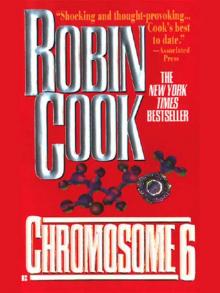 Chromosome 6
Chromosome 6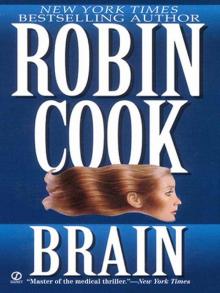 Brain
Brain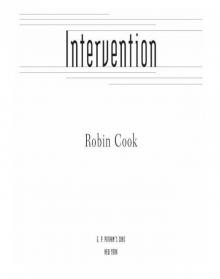 Intervention
Intervention Invasion
Invasion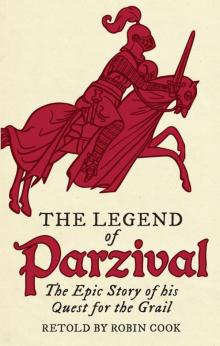 The Legend of Parzival: The Epic Story of His Quest for the Grail
The Legend of Parzival: The Epic Story of His Quest for the Grail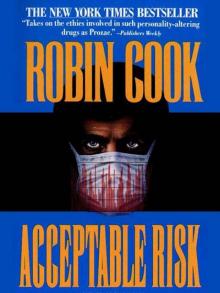 Acceptable Risk
Acceptable Risk Cell
Cell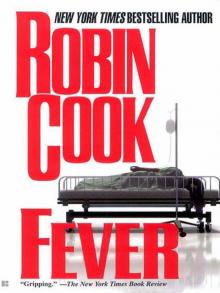 Fever
Fever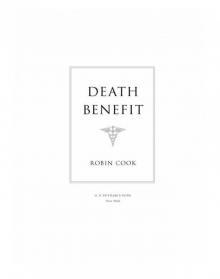 Death Benefit
Death Benefit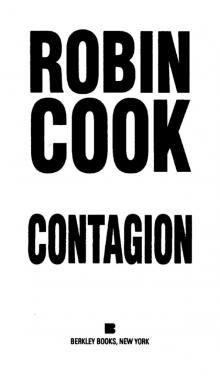 Contagion
Contagion Mindbend
Mindbend Coma
Coma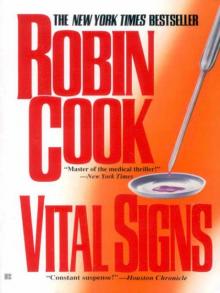 Vital Signs
Vital Signs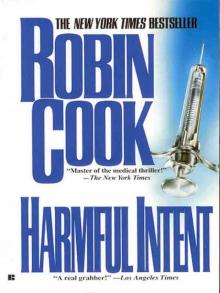 Harmful Intent
Harmful Intent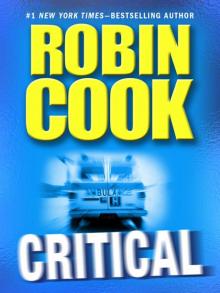 Critical
Critical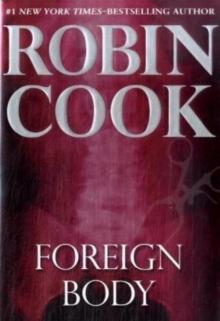 Foreign Body
Foreign Body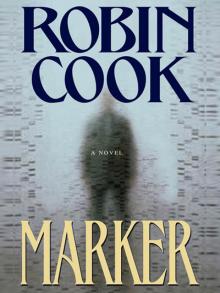 Marker
Marker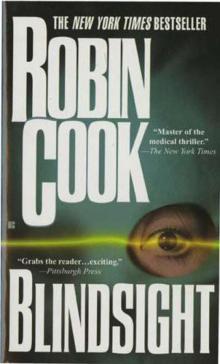 Blindsight
Blindsight Terminal
Terminal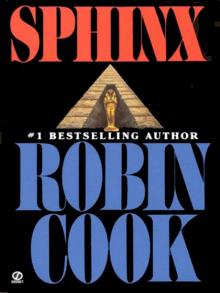 Sphinx
Sphinx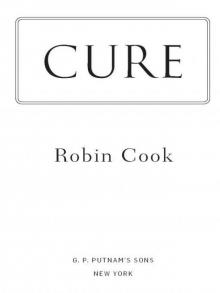 Fatal Cure
Fatal Cure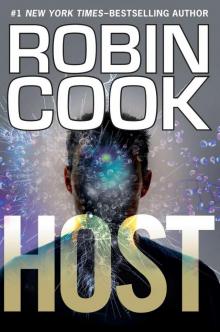 Host
Host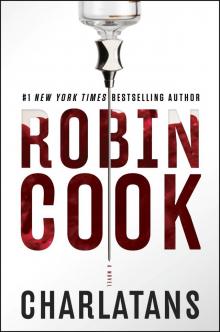 Charlatans
Charlatans Crisis
Crisis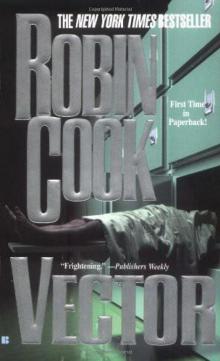 Vector
Vector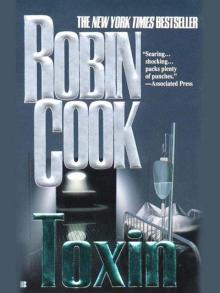 Toxin
Toxin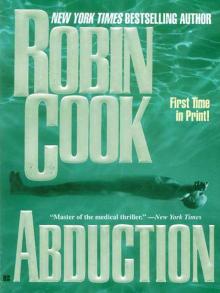 Abduction
Abduction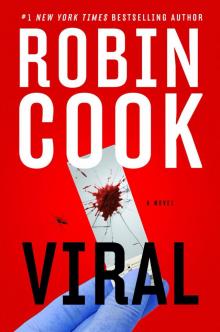 Viral
Viral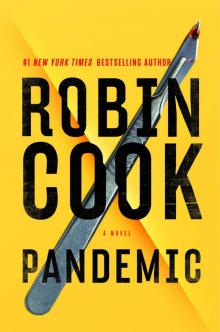 Pandemic
Pandemic Outbreak
Outbreak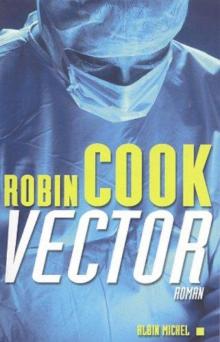 Vector js&lm-4
Vector js&lm-4 Godplayer
Godplayer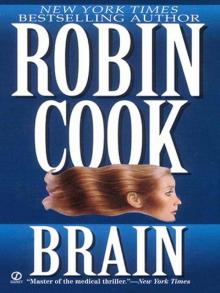 A Brain
A Brain Year of the Intern
Year of the Intern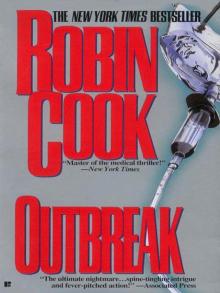 Outbreak dmb-1
Outbreak dmb-1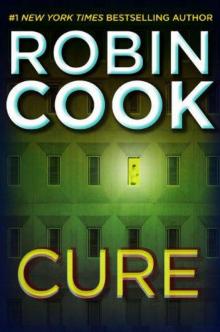 Cure
Cure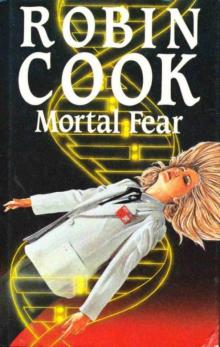 Mortal Fear
Mortal Fear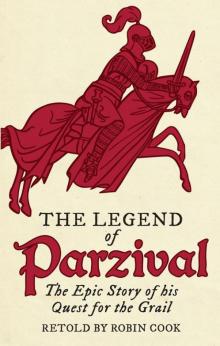 The Legend of Parzival
The Legend of Parzival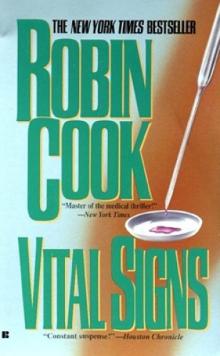 Vital Signs dmb-2
Vital Signs dmb-2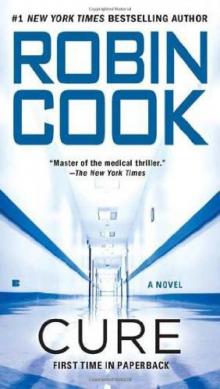 Cure (2010) sam-10
Cure (2010) sam-10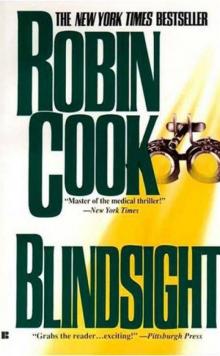 Blindsight sam-1
Blindsight sam-1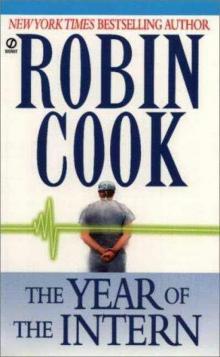 The Year of the Intern
The Year of the Intern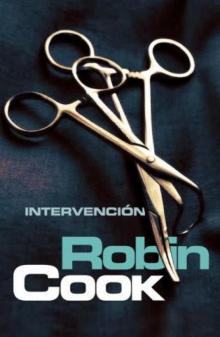 Intervention sam-9
Intervention sam-9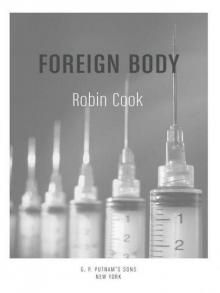 Foreign Body sam-8
Foreign Body sam-8